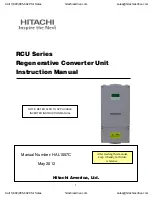
5. Operation
5.1. How does the battery monitor work?
The main function of the battery monitor is to follow and indicate the state of charge of a battery, to be able to know how much
charge the battery contains and to prevent an unexpected total discharge.
The battery monitor continuously measures the current flow in and out of the battery. Integration of this current over time, if it was
a fixed current, boils down to multiplying current and time and gives the net amount of Ah added or removed.
For example, a discharge current of 10A for 2 hours will take 10 x 2 = 20Ah from the battery.
To complicate matters, the effective capacity of a battery depends on the rate of discharge, the Peukert efficiency, and, to a
lesser extent, the temperature. And to make things even more complicated: when charging a battery more energy (Ah) has to be
‘pumped’ into the battery than can be retrieved during the next discharge. In other words: the charge efficiency is less than 100%.
The battery monitor takes all these factors into consideration when calculating the state of charge.
5.2. Readout overview
The the VictronConnect app battery monitor status screen, displays an overview of the most important parameters. These are:
• State of charge
• Battery voltage
• Battery current
• Power
• Aux input reading (starter battery, midpoint or temperature)
State of charge
This is the actual state of charge of the battery in a percentage and is compensated for both the Peukert efficiency and charge
efficiency. The state of charge is the best way to monitor the battery.
A fully charged battery will be indicated by a value of 100.0%. A fully discharged battery will be indicated by a value of 0.0%.
Please note that if the state of charge indicates three dashes: “---” this means that the battery monitor is in an unsynchronised
state. This mainly occurs when the battery monitor has just been installed or after the battery monitor has been left unpowered
and is powered up again. For more information, see the
Synchronising the battery monitor [16]
chapter.
Voltage
This is the terminal voltage of the battery.
Current
This is the actual current flowing in or out of the battery. A negative current indicates that current is taken from the battery. This
is the current needed for DC loads. A positive current means that current is going into the battery. This is current coming from
charge sources. Keep in mind that the battery monitor will always indicate the total battery current, being the current traveling into
the battery minus the current traveling out of the battery.
Power
The power drawn from or received by the battery.
Consumed Ah
The battery monitor keeps track of the Amp-hours removed from the battery compensated for the efficiency.
Example: If a current of 12A is drawn from a fully charged battery for a period of 3 hours, the readout will show -36.0Ah (-12 x 3 =
-36).
Please note that if the "Consumed Ah" reading indicates three dashes: “---” this means that the battery monitor is in an
unsynchronised state. This mainly occurs when the battery monitor has just been installed or after the battery monitor has been
left unpowered and is powered up again. For more information, see the
Synchronising the battery monitor [16]
chapter.
Time remaining
The battery monitor estimates how long the battery can support the present load. This is the “time-to-go” readout and is the actual
time left until the battery is discharged to the set “discharge floor”. The discharge floor is by default set at 50%. For the discharge
floor setting see the
chapter. If the load is fluctuating heavily, it is best not to rely on this reading too much,
Manual - SmartShunt IP65
Page 12
Operation
















































